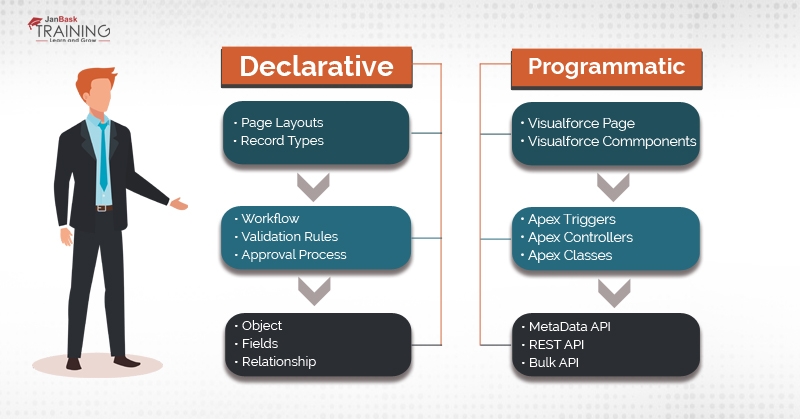19
SepGrab Deal : Upto 30% off on live classes + 2 free self-paced courses - SCHEDULE CALL
Salesforce is a CRM of today’s world and can be implemented easily by several organizations to manage their business operations. Salesforce offers a number of enterprise management tools that can help managers in managing applications. There are four types of Salesforce career profiles that include Salesforce Administrators, Force.com developers, Architects, and Salesforce Implementation experts. Here,
Here, we have brought this article to provide the complete information of the Salesforce coding interface that will help you in shaping your career as a Salesforce Developer. Even many times, the Salesforce developers may have to be cloud certified. For this purpose, they may have to take part in classroom learning and Salesforce certification courses. To grow any business and build new applications, professionals have to learn coding techniques and syntaxes. The below-listed IT skills may be required to become a proficient coding expert:
In this post, we will focus on how to improve the coding skills for APEX and Visualforce. Let us start out a discussion with the basics first.
Salesforce came into existence 13 years ago and it was introduced by Marc Benioff. It is best known as the customer relationship software. Since its evolution, it has made several acquisitions and has developed and offered a variety of products. The six major offerings of Salesforce are given as below -
Here, these platforms are used for a variety of reasons and may require coding as well. Before you dive into the programming world of Salesforce you should know the way to build a Salesforce application for that we will have to describe the model-view-controller architecture of Salesforce. Here, the terms are used in the following way:
There are two approaches that can be adopted by Salesforce developers for programming, one is a declarative approach and the other is a programmatic approach. When user interface cannot be achieved through a declarative approach then programmatic approaches are being used like Visualforce pages or components. The programmatic approach of Salesforce includes triggers, controllers and classes. Data models are used by the declarative models and can also be used programmatically by using REST API, bulk API or metadata API.

Read: Start Learning Salesforce: Skills, Training & Career Path
There are four types of platforms that can help the professionals in learning Salesforce coding, they all are listed below:
In this post, we will majorly explain the tips to write visual force code and APEX code. By following these tips, you can not only improve the coding skills but write effective applications too that are highly demanded by top organizations worldwide. Before we move ahead, let us see what is Salesforce skills-based routing.
Salesforce skills-based routing looks at skills required to complete a particular task and matches those skills with the Salesforce Developer skills. To know more about salesforce skills-based routing, you can use trailhead and also don’t forget to match the same with Salesforce Developer skills as well.
Sign up for our self-paced classes and get the highest degree of education with JanBask Training!
Learn Salesforce in the Easiest Way

To start a Salesforce career, Salesforce developer skills should include VisualForce pages writing. To build Salesforce platform applications, you should know the way to build and develop the user interface to write application logic. Visualforce can help the users in developing the user interface and is the framework for the Force.com platform. You can use Visualforce to build the user interface and Salesforce applications. By using Visualforce Markup and Controllers, you can build the following Visualforce templates:
Below listed two steps can be used to write the Visualforce pages:
Read: Understanding Pardot in Salesforce: A Complete Guide
Signup for online training classes now to know all about Salesforce careers.
Salesforce Training For Administrators & Developers

Another important thing to look at in the Salesforce career is Salesforce Apex code writing. Once the user interface has been developed you will have to add the custom logic for the interface. Controller code can be written and the custom logic is added into applications. Apex is used to write custom logic and controller codes; it is basically an object-oriented programming language that helps in writing code for the Force.com platform. Java programmers can easily write such an Apex code. To learn Salesforce coding, you should know and learn Apex programming. In the following scenarios, users need to write the APEX code -
Learning Apex can be a milestone for Salesforce learning and provide you with a complete pathway to become a Salesforce developer. In Apex programming you will have to use various data types and syntaxes along with several variables that are used to receive data from various sources.
Data Types: Basically, users have to use various data types to use Salesforce variables that may be either primitive, SObjects, Collection, and Enums. They all have their separate descriptions and uses, you may have to use all of them at appropriate positions for your business requirements
Classes and Methods: Apex is an object-oriented programming language, so various classes and methods can be used in that. Classes and methods of Salesforce are written in the same way as in Java programming. So, the Java programmers can use it as and when required and do not have to do anything extra to perform the coding and write business logic codes.
Triggers: Salesforce developers must be familiar with Triggers that are used in SQL programming. They are just stored programs that are only invoked when an event takes place. Like either before or after an insert operation the triggers can be fired. Below listed operations are supported by Salesforce Triggers:
Read: Top 187 Salesforce Developer Interview Questions and Answers
Bulk Operations: Your code must always maintain the governor’s limit for Salesforce code and must use and call design patterns. In the case of bulk operations, more than one record are processed. Moreover, rows have to be added to the collection to perform DML operations. Even DML and Data Operations have to be executed to perform bulk operations.
Request for a demo class now and practice all essential salesforce skills right away.
Salesforce Training For Administrators & Developers

Users have to use bulk operations and perform them on data. Salesforce has many frameworks that are used by developers. Apex has many frameworks that can be used by the developers to develop Salesforce applications. Salesforce frameworks are essential and have many characteristics that can be customized as per user requirements.
Even the developers can easily use and code the applications to prepare the applications. Here, frameworks are to be used and Salesforce syntaxes are provided to design, develop, and customize the applications.
So, the blog gives you all necessary details about Salesforce skills, essential Salesforce developer skills, salesforce skills-based routing, and salesforce careers. You can choose any one of Salesforce careers and start a never-ending journey with JanBask training right away.
Read: Salesforce Career Path: Guide to Building a Successful Career in Salesforce
 Pinterest
Pinterest
 Email
Email
The JanBask Training Team includes certified professionals and expert writers dedicated to helping learners navigate their career journeys in QA, Cybersecurity, Salesforce, and more. Each article is carefully researched and reviewed to ensure quality and relevance.

Cyber Security

QA

Salesforce

Business Analyst

MS SQL Server

Data Science

DevOps

Hadoop

Python

Artificial Intelligence

Machine Learning

Tableau
Search Posts
Related Posts
Receive Latest Materials and Offers on Salesforce Course
Interviews